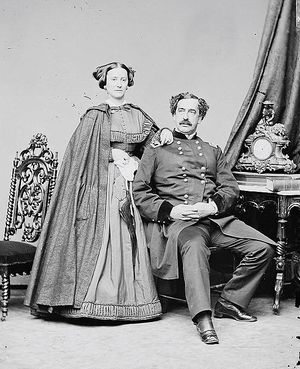Abner Doubleday
|
Abner Doubleday (1819-1893) - Born 26 Jun 1819 in Ballston Spa, New York. A career U.S. Army officer and graduate of the United States Military Academy who served in the Mexican War, the Third Seminole War, the U.S. Civil War and who reached the rank of regular Colonel and brevet Major General. Died 26 Jan 1893 in Mendham, New Jersey.  He entered the United States Military Academy 1 Sep 1838 and graduated 1 Jul 1842 in the Class of 1842 ranking 24th out of 56. After graduation from the United States Military Academy Lt. Doubleday served with the 3rd U.S. Artillery at a number of coastal forts including: Fort Johnston (2), North Carolina; Fort McHenry, Maryland; Fort Moultrie, South Carolina and Fort Preble, Maine. Mexican War (1846-1848)During the Mexican War he served with the 1st U.S. Artillery in Texas at Fort Polk (1) and Fort Brown (1). After that war, he resumed his service in the coastal forts including: Fort Columbus, New York; Fort Hamilton, New York; Fort McHenry, Maryland and Fort Monroe, Virginia. Third Seminole War (1856-1858)During the Third Seminole War he served with the 1st U.S. Artillery at Fort Dallas, Florida and commanded at Fort Capron, Florida. After that war he again resumed service in the coastal forts at Fort Moultrie, South Carolina. U.S. Civil War (1861-1865)At the beginning of the U.S. Civil War Captain Abner Doubleday was stationed at Fort Moultrie in Charleston Harbor as the commander of Company E, 1st U.S. Artillery. He was accompanied by his wife Mary. As the war became inevitable, the troops at Fort Moultrie were evacuated on 26 Dec 1860 to Fort Sumter, in the middle of Charleston Harbor. The officer's wives were mostly evacuated north while the enlisted wives remained in the local area, they were finally evacuated on 3 Feb 1861 by the steamer Marion. Mary Doubleday came back to visit her husband at Fort Sumter on 3 Jan 1861. Captain Doubleday was second in command at Fort Moultrie and Fort Sumter and, as the war began on 12 Apr 1861, he is said to have aimed the cannon that fired the first Union shot of the war. Fort Sumter was surrendered on 14 Apr 1861, Captain Doubleday was released and went on to briefly command Fort Hamilton, New York and was promoted to Major in May 1861. He participated in many of the major battles of the war including Bull Run, Antietam, Fredericksburg, and Chancellorsville. At Gettysburg, he fought all three days and on the last day he aided in turning back Pickett's Charge. During the war, he rose to the rank of regular Colonel and brevet Major General. At the end of the war, he reverted to his regular Colonel rank. Post U.S. Civil WarAfter the war, Colonel Doubleday served on several boards and commissions and spent two years as Superintendent of Recruiting Service in San Francisco, California. From 1871 to 1873 he commanded the black 24th U.S. Infantry Regiment at Fort McKavett and Fort Brown (1) in Texas. Abner Doubleday authored several books including: "Reminiscences of Forts Sumter and Moultrie in 1860-61" and "Chancellorsville and Gettysburg" as well as numerous articles on military matters. He chartered the first cable car railway company in the United States in San Francisco. Abner Doubleday died on 26 Jan 1893 in Mendham, New Jersey. He was buried in section 1, grave 61, Arlington National Cemetery in Arlington, Virginia. The 12" Endicott Period gun battery, Battery Doubleday on Fort Hamilton was named in G.O. 43, 4 Apr 1900, for Major General Abner Doubleday. A full-length statue of him stands on South Reynolds Av in the Gettysburg Battlefield. Evidence for declaring Abner Doubleday the "inventor" of baseball exists but it is not conclusive and it is important to note that he never made that claim. The 1907 Mills Commission took the account of 71-year-old Abner Graves as the true story despite facts that contradicted that story. The commission never questioned the account. Notwithstanding, the baseball field at the Military Academy at West Point has been named Doubleday Field.
Father: Ulysses Freeman Doubleday (1792–1866) Mother: Hester Donnelly (1788–1859) Marriage:
Children:
Assignments:
Personal Description:
Sources: |